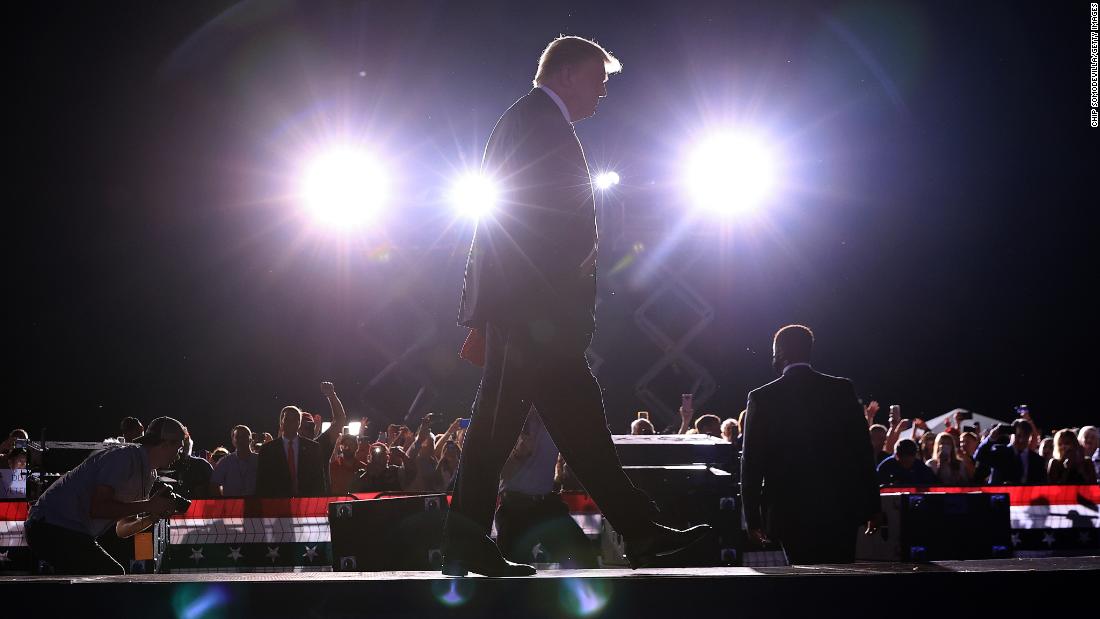
(CNN)The greatest trick Donald Trump ever pulled was keeping the Republican Party loyal to him even after he cost the GOP control of the White House, Senate and House over his four years in office.
I've been continually baffled/amazed at how Trump has seemed to tighten his stranglehold over the party despite scads of evidence that make very clear that his presidential term was an unmitigated disaster for his side, electorally speaking. Any other person who presided over this much losing would be cast aside by a party desperate to move on. Instead, Trump is the unquestioned party head and frontrunner for the 2024 nomination.
All of which makes very little obvious sense. Unless, that is, you do a deep dive into the various strains of belief within the Republican Party -- at which point it all starts to make some sense.
Which is exactly what Pew did -- in its annual political typology survey.
What the typology poll seeks to do is to suss out the various factions within each of the two major political parties -- and dig deep on what they believe and why.
The data splits the Republican Party into four main buckets: "Faith & Flag Conservatives," "Committed Conservatives," "Populist Right" and "Ambivalent Right."
Of those groups, two are the largest with 23% of Republicans and Republican leaners each fitting into each bucket: "Faith & Flag Conservatives" and "Populist Right."
Those two groups then comprise approximately half of all Republican voters. And their numbers dwarf those who Pew identifies as "Committed Conservatives" (18%) and the "Ambivalent Right" (13%).
Which makes the common threads between what those "Faith & Flag Conservatives" and the "Populist Right" all the more interesting. And what does link them? Their continued support for Trump -- and the idea that the November 2020 election was not conducted fairly.
Of "Faith & Flag Conservatives" Pew notes:
"They are among Donald Trump's strongest supporters -- both while he was in office and today. Most say Trump definitely or probably is the legitimate winner of the 2020 election."
And the poll has this to say about the "Populist Right":
"Like Faith and Flag Conservatives, Populist Right strongly support Trump, and most (81%) would like him to remain a prominent political figure, including 57% who say he should run for president in 2024."
Pew is careful to note that these two groups are not monolithic. They "differ over corporate power, economic inequality and taxation of large businesses and wealthy individuals."
But, for the purposes of understanding Trump's continued appeal, the similarities between these two groups are what's important. And, if we take it out of the language of Pew and put it more into our traditional ways of describing the coalitions within the GOP, Trump's sustained strength within the party starts to make more sense.
Substitute "evangelicals" for "Faith & Flag Conservatives" and combine that with anti-establishment/anti-elite Republicans ("Populist Right") and you can understand how Trump not only won the Republican primary in 2016 but also remains such a potent force within the party.
(Sidebar: What's still something of a mystery is how thrice married and openly profane Donald Trump became the preferred voice of evangelicals in this country.)
Trump effectively controls half of the party solely because he is who he is -- a natural populist committed to appointing conservative judges. And, the other factions within the party are simply not strong enough to stand up to him.
Again, take Pew's "Committed Conservatives" and read that as "establishment Republicans." (As Pew puts it of this group: "When asked to name the best president of the last 40 years, they are much more likely to say Ronald Reagan than any of his successors.")
Even if you combine those establishment Republicans with the "Ambivalent Right," you only cover 3 in every 10 Republicans in the party. And there's plenty of reasons not to combine those two groups since the "Ambivalent Right" "are far more moderate on immigration and on social issues like abortion, same-sex marriage and marijuana legalization."
The simple conclusion from the Pew study is this: Members of the "Faith & Flag Conservatives" dovetail very nicely with those in the "Populist Right" -- and both groups, which make up roughly half of all Republicans, remain extremely loyal to the former president and believe his Big Lie about the 2020 election.
And there's this: The factions within the GOP who are more skeptical of Trump and his broader populism are both relatively small and too internally fractured to represent any sort of real resistance to the former president.
Which all means that the Trumpist base within the party remains quite strong -- and that there is very little chance of Trump not being the party's nominee again in 2024 if he decides to run.
"continued" - Google News
November 11, 2021 at 12:26AM
https://ift.tt/3wwwiHT
Here's the math behind Donald Trump's continued dominance over the Republican Party - CNN
"continued" - Google News
https://ift.tt/2WiTaZN
https://ift.tt/2YquBwx
Bagikan Berita Ini














0 Response to "Here's the math behind Donald Trump's continued dominance over the Republican Party - CNN"
Post a Comment